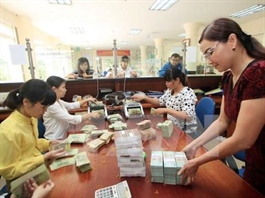Central banks to amend regulations on bank card operation
Central banks to amend regulations on bank card operation
The State Bank of Vietnam (SBV) is developing regulations to amend Circular No 19/2016/TT-NHNN on bank card operation. It hopes to receive feedback from the public to make appropriate adjustments, Phạm Anh Tuấn, director of the SBV’s Payment Department, said.

A customer uses a credit card for payment. The cards will be issued only in the form of eKyc with a chip-embedded ID in the near future. — VNA/VNS Photo |
The change aims to establish a comprehensive legal framework to promote non-cash payments and card development in the country.
Tuấn said that the SBV oversees and develops the new circular and wishes to gather opinions to understand fully the challenges and limitations in the process of card development and trading. The SBV’s Payment Department will review and report to the SBV leaders for suitable adjustments to the new circular.
The Vietnamese card market has seen a rapid growth in recent years, significantly contributing to the rise of non-cash payments in the country. As of July 2023, the number of cards in circulation exceeded 140 million (an increase of 8.27 per cent compared to the end of 2021), of which over 103 million were domestic cards and 36.7 million were international ones. Out of these, nearly 10.8 million cards were opened with eKyc by 27 banks.
According to experts, Việt Nam boasts many favourable conditions to develop cashless payments. By the end of 2022, more than 77.41 per cent of Vietnamese adults held payment accounts with banks. The market is currently evolving a digital ecosystem that links banks with public service organisations, providing a seamless experience for users. Consumers merely need one application to make payments, from movie tickets to meals. The Vietnamese card market, especially domestic credit cards, has significant potential for growth.
Tuấn stated that the SBV supports credit institutions in transitioning from magnetic cards to chip cards. Thanks to this open approach, the issuance of cards using eKyc is on the rise.
In the future, the SBV will introduce several strategies to encourage non-cash payment and card activities. Soon, cards will be issued exclusively as eKyc with an embedded chip, he said.
Tuấn also noted that the SBV is examining and progressing towards the establishment of a digital ecosystem in the banking sector to offer the best experience for customers. It will introduce services leveraging new technologies such as contactless payment and QR Codes.
Concerning public services, the SBV and other relevant agencies will persistently advocate for electronic payments, particularly for state budget revenue, education, and health care, while ensuring security and confidentiality in transactions, Tuấn added.






















